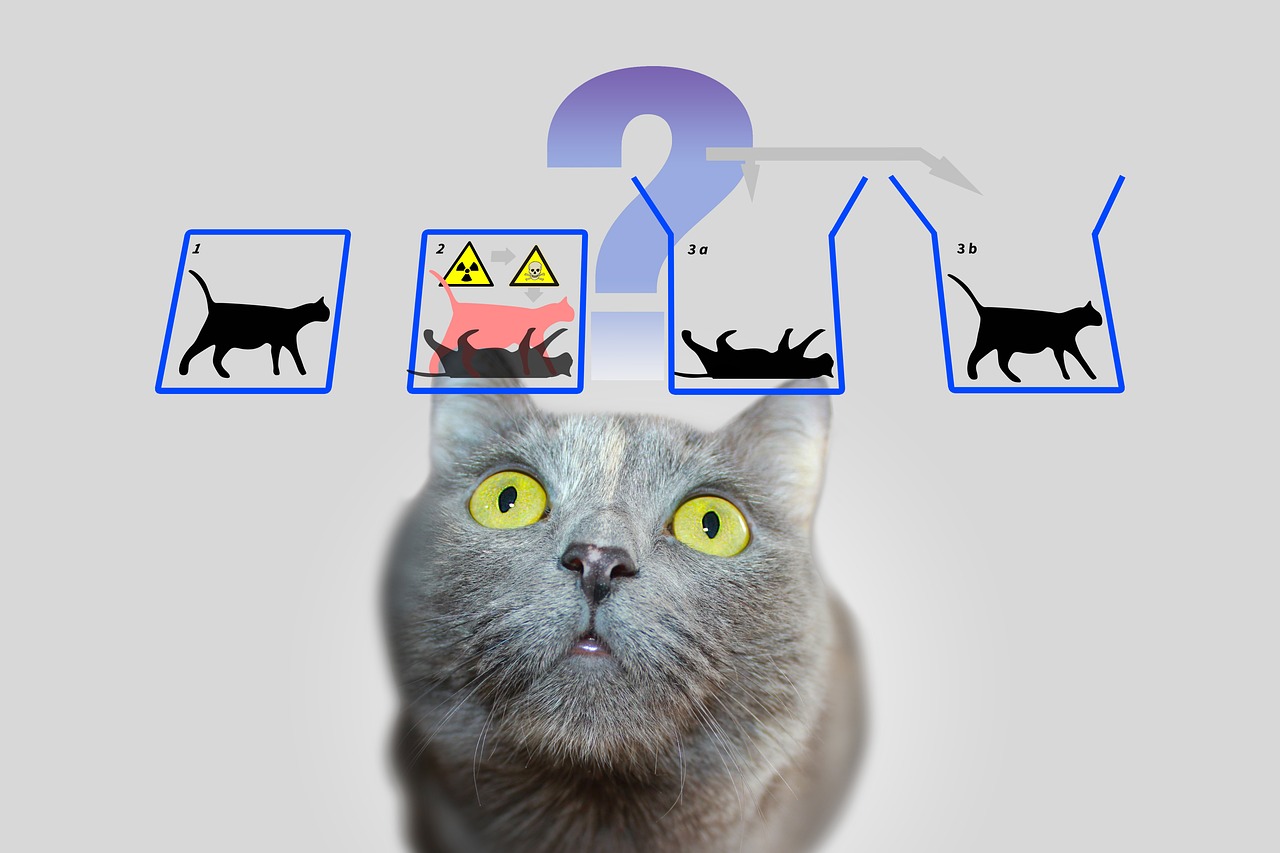The Philosophy of Science - An Exploration into Quantum Chemistry
Have you ever pondered the mysteries of the universe? The dance of atoms and molecules, the very fabric of reality, is governed by the principles of quantum mechanics. This article delves into the intricate relationship between philosophy and quantum chemistry, exploring its foundational principles, implications, and the philosophical questions it raises about the nature of reality and scientific knowledge. As we embark on this journey, we will uncover how the tiny world of particles can lead to profound insights about existence itself.
At its core, quantum chemistry merges the fascinating realms of quantum mechanics and chemical systems. Imagine trying to understand how a symphony of molecules performs a melody; quantum chemistry provides the sheet music. Fundamental concepts such as wave functions, quantum states, and the pivotal Schrödinger equation play critical roles in this field. The wave function, for instance, can be thought of as a musical score that describes the probabilities of a particle's position and momentum, allowing chemists to predict molecular behavior with astonishing accuracy.
The evolution of quantum chemistry is not just a tale of scientific discovery; it is a saga woven through the fabric of history. Each breakthrough is a chapter that reflects the intellectual climate of its time. From the early 20th century, when classical physics began to falter in the face of new discoveries, to the formulation of quantum theories that would reshape our understanding of matter, the historical context is rich and complex. Key milestones include the introduction of quantization and the development of atomic models, all of which set the stage for the philosophical implications that would follow.
Many brilliant minds have contributed to the field of quantum chemistry, each leaving an indelible mark on both science and philosophy. Let's take a closer look at a few pivotal figures:
| Scientist | Contribution | Philosophical Impact |
|---|---|---|
| Max Planck | Quantum Hypothesis | Challenges classical views of energy and matter |
| Niels Bohr | Atomic Model | Introduces debates on determinism |
| Linus Pauling | Covalent Bonds | Influences understanding of chemical bonding |
Max Planck's introduction of quantization was nothing short of revolutionary. He proposed that energy is not continuous but rather comes in discrete packets, or quanta. This idea shattered the classical view of energy and laid the groundwork for modern physics and chemistry. The philosophical implications of this hypothesis are profound, as it forces us to reconsider our understanding of reality. Are we merely observing a deterministic universe, or is there an inherent randomness that defines the quantum realm?
Niels Bohr took Planck's ideas further with his model of the atom. His work illuminated the structure of the atom and introduced the concept of quantized energy levels. Bohr's theories ignited philosophical debates about determinism and the nature of scientific explanation. If we cannot predict the exact position of an electron, what does that mean for our understanding of knowledge itself? Are we merely spectators in a universe governed by chance?
Quantum chemistry raises profound philosophical questions about reality, observation, and knowledge. The interpretations of quantum mechanics, such as the Copenhagen interpretation and the many-worlds theory, challenge our traditional notions of existence. The Copenhagen interpretation suggests that particles exist in a state of probability until observed, leading to the question: does reality depend on our observation? On the other hand, the many-worlds theory posits that every quantum event spawns a new universe, creating a multiverse of possibilities. What does this mean for our understanding of choice and consequence?
As we delve deeper into the implications of quantum chemistry, we must also consider the ethical dimensions of scientific research. The intersection of ethics and quantum chemistry is increasingly relevant in our technologically driven society. How do we navigate the responsible use of technology that arises from quantum discoveries? The ethical considerations extend beyond the laboratory and into the broader societal implications of these advancements.
Quantum chemistry has led to significant technological innovations, including the burgeoning field of quantum computing. These advancements challenge traditional ethical frameworks, as they possess the potential to revolutionize industries. Scientists bear the responsibility of ensuring that these technologies are applied for the greater good, rather than being exploited for harmful purposes. The ethical implications of quantum discoveries are vast, and it is crucial to engage in ongoing discussions about their impact on society.
The societal implications of quantum chemistry are profound, influencing fields such as medicine, materials science, and even energy production. Imagine a world where quantum discoveries lead to breakthroughs in drug development or create materials with unprecedented properties. However, with great power comes great responsibility. As quantum chemistry transforms industries, we face ethical dilemmas regarding accessibility, equity, and the potential for misuse. How do we ensure that the benefits of these advancements are shared widely rather than concentrated in the hands of a few?
Looking ahead, the field of quantum chemistry promises to unveil new scientific frontiers that we can barely imagine today. Emerging trends such as quantum simulations and advancements in artificial intelligence are set to redefine our understanding of chemical systems. However, as we explore these uncharted territories, we must remain vigilant about the potential philosophical challenges that may arise. How will our understanding of reality evolve as we delve deeper into the quantum realm? The answers may reshape not only our scientific landscape but also our philosophical inquiries into the nature of existence itself.
- What is quantum chemistry? Quantum chemistry is the study of how quantum mechanics applies to chemical systems, providing insights into molecular behavior.
- Who are the key figures in the development of quantum chemistry? Key figures include Max Planck, Niels Bohr, and Linus Pauling, each contributing significantly to the field.
- What are the philosophical implications of quantum mechanics? Quantum mechanics raises questions about reality, observation, and determinism, challenging traditional views of existence.
- How does quantum chemistry impact society? It influences various fields, including medicine and materials science, prompting ethical considerations regarding technology and its applications.
- What are the future directions for quantum chemistry? Future research may focus on quantum simulations and artificial intelligence, potentially reshaping our understanding of chemical systems.

Understanding Quantum Chemistry
Quantum chemistry is a fascinating field that merges the principles of quantum mechanics with the study of chemical systems. Imagine trying to understand the behavior of molecules as if they were tiny particles dancing to the rhythm of the universe's most intricate laws. At its core, quantum chemistry seeks to explain how atoms interact and bond, revealing the underlying rules that govern these interactions. It provides a framework for understanding the complex behavior of matter at a microscopic level, allowing scientists to predict the properties and reactions of molecules with remarkable accuracy.
One of the foundational concepts in quantum chemistry is the wave function, which encapsulates all the information about a quantum system. Think of it as a detailed map that guides us through the unpredictable landscape of molecular behavior. The wave function is a mathematical description that allows chemists to calculate the probabilities of finding a particle in a particular state or position. This concept is crucial because, unlike classical mechanics, where objects have definite positions and velocities, quantum mechanics introduces a level of uncertainty that can be both bewildering and enlightening.
Another essential element is the Schrödinger equation, a cornerstone of quantum mechanics that describes how the quantum state of a physical system changes over time. This equation is akin to a musical score, orchestrating the symphony of molecular dynamics. By solving the Schrödinger equation for a given system, chemists can obtain the wave functions and energy levels of molecules, leading to insights about their chemical properties and reactivity.
Quantum states, which represent the different possible configurations of a system, are also fundamental to understanding quantum chemistry. These states are not merely theoretical constructs; they have real-world implications. For example, the electronic structure of a molecule, determined by its quantum states, dictates how it will interact with other molecules, influencing everything from the color of a compound to its reactivity in chemical reactions.
In summary, quantum chemistry is not just a niche area of study; it is a revolutionary approach that challenges our traditional views of chemistry and the nature of reality itself. By combining the abstract principles of quantum mechanics with the tangible world of chemical reactions, it opens up a realm of possibilities that can lead to groundbreaking discoveries in various fields, including materials science, pharmacology, and nanotechnology. As we delve deeper into the intricacies of quantum chemistry, we find ourselves not only unlocking the secrets of matter but also grappling with profound philosophical questions about the very nature of existence.

The Historical Context
The evolution of quantum chemistry is a fascinating journey that intertwines with the broader narrative of scientific advancement. To truly appreciate how we arrived at our current understanding, we must delve into the pivotal moments and breakthroughs that paved the way for this field. It all began at the turn of the 20th century when classical physics faced challenges that its established laws could not adequately address. The advent of quantum theory marked a revolutionary shift, reshaping how scientists perceive the microscopic world.
In the early 1900s, physicists were grappling with phenomena that classical mechanics could not explain, such as the black-body radiation problem. This conundrum led to Max Planck's groundbreaking hypothesis of quantization, suggesting that energy is not continuous but rather emitted in discrete packets called "quanta." This idea was not just a scientific breakthrough; it was a philosophical upheaval. It challenged the very foundations of classical physics and introduced a new way of thinking about energy and matter.
As we move forward in time, the contributions of other key figures become evident. For instance, Niels Bohr's model of the atom, developed in 1913, brought clarity to atomic structure by incorporating quantum principles. His work ignited intense debates about the nature of reality and determinism, as it suggested that electrons exist in probabilistic states rather than fixed orbits. This shift in perspective prompted scientists and philosophers alike to reconsider what it means to truly "know" something in the quantum realm.
The historical timeline of quantum chemistry can be summarized as follows:
| Year | Event | Key Figure |
|---|---|---|
| 1900 | Planck introduces the concept of quantization. | Max Planck |
| 1913 | Bohr presents his model of the hydrogen atom. | Niels Bohr |
| 1926 | Schrödinger formulates the wave equation. | Erwin Schrödinger |
| 1927 | Heisenberg introduces the uncertainty principle. | Werner Heisenberg |
These milestones not only advanced our understanding of atomic and molecular behavior but also raised profound philosophical questions. For instance, the introduction of the Schrödinger equation in 1926 provided a mathematical framework for predicting the behavior of quantum systems, yet it also sparked discussions about the nature of reality itself. Are particles real, or are they merely probabilities? This question continues to resonate in both scientific and philosophical circles.
As we reflect on the historical context of quantum chemistry, it becomes clear that each breakthrough was not merely a scientific achievement but a stepping stone that influenced the philosophical discourse surrounding the nature of knowledge and reality. The interplay between scientific discovery and philosophical inquiry creates a rich tapestry that continues to shape our understanding of the universe.
- What is quantum chemistry? Quantum chemistry is the branch of chemistry focused on the application of quantum mechanics to chemical systems, helping to explain molecular behavior and interactions.
- Who were the key figures in the development of quantum chemistry? Key figures include Max Planck, Niels Bohr, Erwin Schrödinger, and Werner Heisenberg, each contributing significantly to the field's foundations.
- What are the philosophical implications of quantum chemistry? Quantum chemistry raises questions about the nature of reality, observation, and the limits of scientific knowledge, challenging traditional views of determinism and causality.

Key Figures in Quantum Chemistry
When we dive into the fascinating world of quantum chemistry, it’s like peeling back the layers of an onion, revealing not just scientific principles, but also the brilliant minds that shaped its very foundation. Key figures in this field have not only contributed groundbreaking theories but have also sparked philosophical debates that challenge our understanding of reality. Among these luminaries, three names stand out: Max Planck, Niels Bohr, and Linus Pauling.
Max Planck, often regarded as the father of quantum theory, introduced the revolutionary concept of quantization in 1900. His idea that energy is emitted or absorbed in discrete units, or "quanta," fundamentally changed the way scientists view energy and matter. Imagine a world where energy flows like a river, but suddenly, you realize it can only be accessed in chunks, like stepping stones across a stream. This radical shift not only paved the way for quantum mechanics but also opened up philosophical discussions about the nature of reality itself. Planck's work challenged the classical view of physics, leading to questions about determinism and the limits of human knowledge.
Then we have Niels Bohr, whose model of the atom in the early 20th century provided a clearer understanding of atomic structure. Bohr proposed that electrons orbit the nucleus at fixed distances, akin to planets circling the sun. This model was not just a scientific breakthrough; it ignited debates about the nature of scientific explanation. Bohr's interpretation of quantum mechanics suggested that at the atomic level, reality behaves in ways that defy classical intuition. His ideas prompted questions about whether we can ever truly understand the universe or if we are merely observing it through a distorted lens.
Finally, we cannot overlook Linus Pauling, a towering figure in both chemistry and peace activism. Pauling’s work on chemical bonding and molecular structure was groundbreaking, earning him the Nobel Prize in Chemistry in 1954. He was not only a scientist but also a philosopher in his own right, advocating for the ethical use of scientific knowledge. Pauling's contributions led to the realization that the behavior of molecules could be understood through quantum mechanics, further intertwining the fabric of chemistry and philosophy. His legacy prompts us to consider the ethical implications of scientific advancements and the responsibilities of scientists in shaping society.
In summary, the contributions of these key figures in quantum chemistry extend far beyond their scientific achievements. They have laid the groundwork for ongoing philosophical discussions about the nature of reality, the limits of knowledge, and the ethical responsibilities that come with scientific discovery. As we continue to explore the depths of quantum chemistry, we must remember the profound impact these thinkers have had on both science and philosophy.
- What is quantum chemistry? Quantum chemistry is the study of how quantum mechanics applies to chemical systems, helping us understand molecular behavior and interactions.
- Who is considered the father of quantum theory? Max Planck is often referred to as the father of quantum theory due to his introduction of the concept of quantization.
- What did Niels Bohr contribute to quantum chemistry? Niels Bohr developed the Bohr model of the atom, which provided insights into atomic structure and behavior.
- How did Linus Pauling influence the field? Linus Pauling's work on chemical bonding and molecular structure was pivotal in integrating quantum mechanics into chemistry.

Max Planck's Quantum Hypothesis
Max Planck's quantum hypothesis is a cornerstone of modern physics and chemistry, fundamentally altering our understanding of energy and matter. In the early 20th century, Planck proposed that energy is not emitted or absorbed continuously, but rather in discrete packets called quanta. This revolutionary idea emerged from his work on black-body radiation, where he sought to explain why classical physics failed to predict the observed spectrum of light emitted by heated objects.
Imagine a world where energy flows like water from a tap, continuous and unending. Now, consider Planck's insight that energy behaves more like a collection of tiny, indivisible marbles, each representing a quantum. This shift in perspective not only challenged the classical view but also paved the way for the development of quantum theory, which has profound implications for both science and philosophy.
Planck introduced the concept of the Planck constant, denoted as h, which relates the energy of a quantum to its frequency through the equation:
E hν
where E is energy, h is the Planck constant, and ν (nu) is the frequency of the radiation. This equation encapsulates the essence of quantum mechanics, highlighting the quantized nature of energy levels.
The philosophical implications of Planck's hypothesis are profound. It challenges the deterministic view of classical physics, suggesting that at a fundamental level, nature is inherently probabilistic. This realization raises questions about the limits of human knowledge and our ability to predict outcomes in the quantum realm. Are we merely observers in a universe governed by chance? Or do we play an active role in shaping reality through our measurements and observations?
As we delve deeper into the implications of Planck's quantum hypothesis, we find ourselves at the intersection of science and philosophy. It invites us to reconsider the nature of reality itself, questioning whether what we perceive is merely an illusion shaped by our limited understanding. This exploration not only enriches our scientific knowledge but also enhances our philosophical inquiry into the essence of existence.
In summary, Max Planck's quantum hypothesis not only revolutionized the fields of physics and chemistry but also opened up a Pandora's box of philosophical questions that continue to intrigue scientists and thinkers alike. As we grapple with these ideas, we find ourselves on a journey that challenges our perceptions and expands our understanding of the universe.
- What is the significance of Planck's constant?
Planck's constant is fundamental in quantum mechanics, linking the energy of a photon to its frequency, thereby establishing the quantized nature of energy.
- How did Planck's hypothesis change our understanding of physics?
It introduced the concept of quantization, leading to the development of quantum mechanics, which describes phenomena at atomic and subatomic levels.
- What philosophical questions arise from quantum theory?
Quantum theory raises questions about determinism, reality, and the nature of observation, challenging our understanding of existence.
- How does Planck's hypothesis relate to modern technology?
Planck's ideas laid the groundwork for advancements in quantum computing, lasers, and other technologies that have transformed various fields.

Niels Bohr and Atomic Theory
Niels Bohr, a name synonymous with the evolution of atomic theory, transformed how we understand the building blocks of matter. His model of the atom, introduced in the early 20th century, was revolutionary. Imagine the atom as a miniature solar system, where electrons orbit the nucleus much like planets orbit the sun. This analogy helped to visualize concepts that were otherwise abstract and complex. Bohr's model not only simplified the understanding of atomic structure but also paved the way for deeper philosophical discussions about the nature of reality and determinism in science.
One of the key features of Bohr's atomic theory is the concept of quantized energy levels. In simple terms, this means that electrons can only occupy specific energy states and can jump between these states by absorbing or emitting energy. This idea was groundbreaking because it contradicted classical physics, which suggested that energy could vary continuously. Bohr's quantization of energy levels led to the development of the Bohr model, which accurately explained the spectral lines of hydrogen, a significant milestone in both chemistry and physics.
However, the implications of Bohr's theory extend beyond mere scientific advancement. It sparked intense philosophical debates, particularly regarding the concept of determinism. Prior to Bohr, many scientists believed in a deterministic universe, where every event could be predicted if one had enough information. Bohr's introduction of quantized states and the inherent uncertainties in measuring them challenged this notion. He famously stated, "If quantum mechanics hasn't profoundly shocked you, you haven't understood it yet," highlighting the radical departure from classical ideas.
Moreover, Bohr's work led to the development of the Copenhagen Interpretation of quantum mechanics, which posits that physical systems do not have definite properties until they are measured. This interpretation raises profound questions about the nature of reality: Are we merely observers in a universe that exists independently of our measurements, or does our observation play a crucial role in shaping reality? These questions have philosophical ramifications that continue to be debated among scientists and philosophers alike.
In summary, Niels Bohr's contributions to atomic theory were not just scientific milestones; they were philosophical game-changers. By introducing quantized energy levels and challenging classical determinism, he opened the door to a new understanding of the atomic world and the very fabric of reality. His work invites us to ponder the complexities of observation, measurement, and the nature of knowledge itself.
- What was Niels Bohr's main contribution to atomic theory?
Bohr introduced the concept of quantized energy levels in atoms, revolutionizing our understanding of atomic structure. - How did Bohr's model differ from earlier atomic theories?
Unlike earlier models, Bohr's theory suggested that electrons occupy fixed energy levels rather than existing in a continuous range. - What is the Copenhagen Interpretation?
This interpretation suggests that physical systems do not have definite properties until they are measured, challenging classical notions of reality. - Why is Bohr's work significant beyond physics?
His contributions sparked philosophical debates about determinism and the nature of observation, impacting both science and philosophy.

Philosophical Implications
The realm of quantum chemistry is not just a playground for scientists; it also serves as a fascinating battleground for philosophers. The very nature of reality, as unveiled by quantum mechanics, challenges our traditional notions of observation, knowledge, and existence. Have you ever pondered how something can exist in multiple states at once? This is the crux of the philosophical implications that quantum chemistry presents. At the heart of these discussions are interpretations of quantum mechanics, which raise questions about determinism, free will, and the fabric of reality itself.
One of the most prominent interpretations is the Copenhagen interpretation, which posits that physical systems do not have definite properties until they are measured. This leads us to ask: if a tree falls in a forest and no one is there to hear it, does it make a sound? In quantum terms, until we observe the tree, it exists in a superposition of states—both falling and not falling. This idea forces us to reconsider our understanding of knowledge. How can we claim to know something if its state is contingent upon our observation?
Another compelling interpretation is the many-worlds theory, which suggests that all possible outcomes of quantum measurements actually occur, each in its own separate universe. Imagine a vast multiverse where every decision you make spawns a new reality. This concept not only expands the horizon of scientific inquiry but also invites philosophical debate about the nature of choice and consequence. Are we merely players in a cosmic game, with our actions leading to branches of existence that we cannot see or influence?
Furthermore, quantum entanglement introduces another layer of complexity. When particles become entangled, the state of one instantaneously influences the state of another, regardless of the distance separating them. This phenomenon raises questions about locality and causality. If two particles can affect each other instantaneously, what does that say about the nature of space and time? Are we witnessing a fundamental interconnectedness in the universe that defies classical understanding?
In summary, the philosophical implications of quantum chemistry extend far beyond the laboratory. They challenge our perceptions of reality, knowledge, and existence itself. As we delve deeper into the quantum realm, we must grapple with these profound questions that not only shape the future of science but also our understanding of what it means to be human in an ever-expanding universe.
- What is the Copenhagen interpretation? - This interpretation suggests that a quantum system remains in superposition until it is observed, at which point it takes on a definite state.
- What does the many-worlds theory propose? - It posits that all possible outcomes of quantum events occur in separate, parallel universes.
- How does quantum entanglement challenge classical physics? - It suggests that particles can be instantaneously connected regardless of distance, defying classical notions of locality.
- What are the ethical implications of quantum discoveries? - As quantum technologies advance, they raise questions about responsible use and the societal impact of these innovations.

Ethics in Quantum Chemistry
As we venture deeper into the fascinating world of quantum chemistry, the intersection of ethics and scientific discovery becomes increasingly significant. The profound implications of quantum research extend beyond the realm of theoretical exploration and into the very fabric of society. With the potential to alter our understanding of the universe and the technologies we develop, it raises critical ethical questions that scientists and society must grapple with.
One of the primary ethical considerations in quantum chemistry is the responsible use of technology. As we harness the power of quantum mechanics, particularly in fields such as quantum computing and materials science, we must ponder the consequences of our innovations. For instance, while quantum computing promises unparalleled processing power, it also poses risks to data security and privacy. How do we ensure that these powerful tools are used for the greater good rather than malicious purposes? The responsibility lies heavily on scientists and technologists to navigate these waters wisely.
Moreover, the implications of quantum discoveries on society are vast. Quantum chemistry is not just a theoretical pursuit; it has practical applications that can transform industries, especially in medicine and energy. For example, advancements in drug discovery leveraging quantum simulations could lead to revolutionary treatments. However, this also brings forth ethical dilemmas regarding access to such technologies. Will these advancements be available to all, or will they create a divide between those who can afford them and those who cannot? The ethical implications of accessibility and equity in scientific advancements cannot be understated.
To further illustrate the ethical landscape, consider the following key areas where ethics in quantum chemistry plays a crucial role:
- Research Integrity: Ensuring that research is conducted honestly and transparently, avoiding conflicts of interest that could skew results.
- Environmental Impact: Evaluating the ecological consequences of new materials and technologies developed through quantum chemistry.
- Societal Responsibility: Engaging with the public to understand the societal implications of quantum discoveries and fostering informed discussions.
As quantum chemistry continues to evolve, the ethical frameworks surrounding it must also adapt. Scientists must not only focus on the scientific advancements they are making but also consider the broader implications of their work. This includes engaging with ethicists, policymakers, and the public to create a dialogue that ensures the responsible development and application of quantum technologies.
In conclusion, the ethical dimensions of quantum chemistry are as complex as the quantum systems it studies. As we stand on the brink of new scientific frontiers, we must remain vigilant in our ethical considerations, ensuring that our discoveries serve humanity positively and equitably. The journey into quantum chemistry is not just about understanding the building blocks of matter; it’s about shaping a future where science and ethics go hand in hand.
Q1: What are the main ethical concerns in quantum chemistry?
A1: The main ethical concerns include responsible use of technology, research integrity, environmental impact, and societal responsibility regarding access to advancements.
Q2: How can scientists ensure ethical practices in their research?
A2: Scientists can ensure ethical practices by adhering to guidelines for research integrity, engaging with ethicists, and maintaining transparency in their work.
Q3: What role does public engagement play in the ethics of quantum chemistry?
A3: Public engagement is crucial as it fosters informed discussions about the societal implications of quantum discoveries, ensuring that advancements benefit all segments of society.

Technological Advancements
Quantum chemistry has not only transformed our understanding of the microscopic world but has also catalyzed significant that are reshaping various fields. One of the most exciting developments is in the realm of quantum computing, a technology that harnesses the principles of quantum mechanics to process information in ways that classical computers cannot. Imagine a computer that can solve complex problems in seconds, problems that would take today’s supercomputers thousands of years to crack. This is not just a dream; it is a burgeoning reality.
At the heart of quantum computing lies the quantum bit or qubit, which can exist in multiple states simultaneously due to the principle of superposition. This capability allows quantum computers to perform many calculations at once, exponentially increasing their computational power. As a result, industries ranging from pharmaceuticals to finance are beginning to explore how these machines can revolutionize their operations. For instance, in drug discovery, quantum computers could simulate molecular interactions at an unprecedented scale, drastically reducing the time and cost associated with bringing new drugs to market.
However, with great power comes great responsibility. The rapid pace of technological advancements in quantum chemistry raises numerous ethical considerations. As scientists and researchers delve deeper into the quantum realm, they must grapple with questions about the responsible use of technology. This includes ensuring that quantum computing is not used for malicious purposes, such as breaking encryption or developing advanced weaponry. The ethical implications extend beyond just the technology itself; they also touch on societal impacts, such as job displacement in traditional computing sectors.
To better understand the implications of these advancements, consider the following table that outlines some key areas where quantum chemistry is driving technological change:
| Field | Technological Advancement | Potential Impact |
|---|---|---|
| Pharmaceuticals | Quantum Drug Discovery | Faster development of new medications |
| Finance | Quantum Algorithms | Enhanced risk analysis and investment strategies |
| Materials Science | Quantum Simulation | Development of new materials with unique properties |
| Cryptography | Quantum Encryption | Unbreakable security measures |
As we venture further into the quantum age, the relationship between technology and ethics will become increasingly intertwined. Scientists must not only be innovators but also stewards of the technology they create. The questions we face today about the direction of quantum advancements will undoubtedly shape the landscape of tomorrow's society. Are we prepared to handle the ethical dilemmas that accompany such powerful tools? This is a question that demands our attention.
In conclusion, the technological advancements spurred by quantum chemistry are not merely scientific achievements; they are profound shifts that challenge our ethical frameworks and societal norms. As we stand at the precipice of this new era, it is essential to engage in conversations about the responsibilities that come with such power. The future of quantum technology is bright, but it is our duty to ensure that it illuminates the path to a better, more equitable world.
- What is quantum chemistry? Quantum chemistry is the study of how quantum mechanics applies to chemical systems, providing insights into molecular behavior and interactions.
- How does quantum computing differ from classical computing? Quantum computing uses qubits that can exist in multiple states at once, enabling it to perform many calculations simultaneously, unlike classical bits that are either 0 or 1.
- What are the ethical concerns surrounding quantum technology? Ethical concerns include the potential misuse of quantum computing for malicious purposes, job displacement, and ensuring equitable access to technology.
- How can quantum chemistry impact drug discovery? Quantum chemistry can simulate molecular interactions more accurately and efficiently, speeding up the process of drug discovery and development.

Impact on Society
The influence of quantum chemistry on society is nothing short of revolutionary. As we delve into the intricate world of atoms and molecules, we discover that the implications of quantum discoveries extend far beyond the laboratory. They seep into our daily lives, reshaping industries and altering the very fabric of our technological landscape. Imagine a world where the boundaries of medicine, energy, and materials science are pushed to their limits—this is the promise of quantum chemistry.
One of the most significant impacts of quantum chemistry is observed in the field of medicine. Quantum technologies have paved the way for advancements in drug discovery and development. Traditional methods can be time-consuming and costly, but by utilizing quantum simulations, scientists can model complex biological interactions at an unprecedented scale. This allows for the rapid identification of potential drug candidates, significantly speeding up the process of bringing new treatments to market. For instance, quantum algorithms can analyze vast datasets from clinical trials, enhancing our understanding of drug efficacy and safety.
Moreover, the materials science sector is experiencing a renaissance thanks to quantum chemistry. The ability to manipulate material properties at the quantum level has opened doors to creating stronger, lighter, and more efficient materials. For example, quantum-derived materials could lead to breakthroughs in energy storage, such as the development of more efficient batteries or superconductors that operate at room temperature. These advancements could revolutionize everything from consumer electronics to renewable energy systems, ultimately contributing to a more sustainable future.
However, with great power comes great responsibility. The ethical dilemmas arising from these advancements cannot be overlooked. As quantum technologies become more prevalent, society must grapple with questions such as:
- How do we ensure equitable access to these technologies?
- What are the potential risks associated with quantum computing in terms of data security?
- How do we address the environmental impact of new materials developed through quantum chemistry?
These questions highlight the importance of establishing ethical frameworks that guide the responsible use of quantum technologies. Scientists and policymakers must work hand in hand to create regulations that protect society while fostering innovation. The dialogue between science and ethics is crucial as we navigate this uncharted territory.
In conclusion, the impact of quantum chemistry on society is profound and multifaceted. From transforming healthcare to revolutionizing materials science, the potential benefits are immense. Yet, as we stand on the brink of this new era, we must remain vigilant in addressing the ethical implications of our discoveries. Only by doing so can we ensure that the fruits of quantum chemistry serve the greater good of humanity.
- What is quantum chemistry? Quantum chemistry is a branch of chemistry that uses quantum mechanics to explain the behavior of atoms and molecules.
- How does quantum chemistry impact medicine? It accelerates drug discovery and development by enabling scientists to simulate complex biological interactions more efficiently.
- What are the ethical concerns related to quantum chemistry? Ethical concerns include equitable access to technology, data security risks, and the environmental impact of new materials.
- Can quantum chemistry lead to sustainable energy solutions? Yes, advancements in materials science through quantum chemistry can lead to more efficient energy storage and renewable energy technologies.

Future Directions in Quantum Chemistry
The landscape of quantum chemistry is continuously evolving, paving the way for groundbreaking discoveries and innovations. As we look to the future, several exciting directions are emerging that could reshape our understanding of matter at the quantum level. One of the most promising areas is the development of quantum computing, which holds the potential to revolutionize how we simulate complex chemical reactions. Imagine being able to model molecular interactions with unprecedented accuracy and speed—this is not just a dream; it’s becoming a reality as researchers harness the power of quantum bits, or qubits.
Moreover, the integration of quantum chemistry with artificial intelligence is another frontier that is gaining traction. By utilizing machine learning algorithms, scientists can analyze vast amounts of chemical data to predict molecular behavior and properties. This synergy between quantum chemistry and AI could lead to the discovery of new materials, drugs, and catalysts, ultimately transforming industries ranging from pharmaceuticals to renewable energy.
In addition to technological advancements, the philosophical implications of quantum chemistry are also set to expand. As we delve deeper into the quantum realm, questions about the nature of reality and observation will become more pronounced. For instance, the challenge of interpreting quantum phenomena—such as entanglement and superposition—will continue to spark debates among philosophers and scientists alike. The many-worlds interpretation and other theories will require us to rethink our fundamental understanding of existence and the universe. These discussions are not merely academic; they have real-world implications for how we approach scientific inquiry and knowledge.
Furthermore, the ethical dimensions of quantum chemistry will become increasingly significant as new technologies emerge. As we develop advanced quantum technologies, we must also consider their potential impact on society. Questions surrounding the responsible use of quantum computing, the implications of quantum encryption for privacy, and the effects of quantum discoveries on existing industries will challenge us to establish ethical guidelines that reflect the unique nature of quantum science.
To encapsulate the potential future directions in quantum chemistry, we can summarize the key areas of focus in the table below:
| Future Direction | Description |
|---|---|
| Quantum Computing | Utilizing qubits to simulate complex chemical reactions rapidly and accurately. |
| Artificial Intelligence Integration | Employing machine learning to predict molecular behavior and discover new materials. |
| Philosophical Exploration | Examining the implications of quantum phenomena on our understanding of reality. |
| Ethical Considerations | Developing guidelines for the responsible use of quantum technologies in society. |
As we embark on this exciting journey into the future of quantum chemistry, it is crucial to remain open-minded and inquisitive. The questions we ask today will shape the discoveries of tomorrow. Who knows what revelations await us as we continue to explore the intricate dance of particles at the quantum level? The only certainty is that the quest for knowledge will persist, leading us to new horizons in both science and philosophy.
- What is quantum chemistry? Quantum chemistry is the branch of chemistry focused on the application of quantum mechanics to chemical systems, providing insights into molecular behavior and interactions.
- How does quantum computing impact quantum chemistry? Quantum computing enables faster and more accurate simulations of complex chemical reactions, potentially leading to new discoveries and innovations.
- What are the ethical implications of advancements in quantum chemistry? As quantum technologies develop, ethical considerations regarding their use and impact on society become increasingly important, necessitating responsible guidelines and practices.
- What philosophical questions arise from quantum chemistry? Quantum chemistry raises profound questions about the nature of reality, observation, and knowledge, challenging our traditional understanding of scientific inquiry.
Frequently Asked Questions
- What is quantum chemistry?
Quantum chemistry is the branch of chemistry that applies quantum mechanics to the study of chemical systems. It helps us understand molecular behavior and interactions at a fundamental level, revealing how atoms and molecules behave in ways classical physics cannot explain.
- How does the Schrödinger equation relate to quantum chemistry?
The Schrödinger equation is a key mathematical formulation in quantum mechanics that describes how the quantum state of a physical system changes over time. In quantum chemistry, it allows scientists to calculate the wave functions of molecules, providing insights into their properties and behaviors.
- Who were the key figures in the development of quantum chemistry?
Several pivotal figures contributed to the development of quantum chemistry, including Max Planck, who introduced the concept of quantization, and Niels Bohr, who developed the atomic model that advanced our understanding of atomic structure. Their work has significantly influenced both chemistry and philosophy.
- What are the philosophical implications of quantum chemistry?
Quantum chemistry raises profound questions about the nature of reality, observation, and knowledge. Interpretations of quantum mechanics, like the Copenhagen interpretation and the many-worlds theory, challenge our understanding of determinism and the very essence of scientific explanation.
- How does quantum chemistry intersect with ethics?
The intersection of quantum chemistry and ethics is becoming increasingly important as technological advancements emerge. Ethical considerations include the responsible use of quantum technologies and the societal implications of discoveries in fields like medicine and materials science.
- What future directions can we expect in quantum chemistry?
Looking ahead, quantum chemistry is poised to explore new scientific frontiers, potentially unveiling groundbreaking research areas and technologies. However, as the field evolves, it may also present new philosophical challenges that require careful consideration and debate.



















